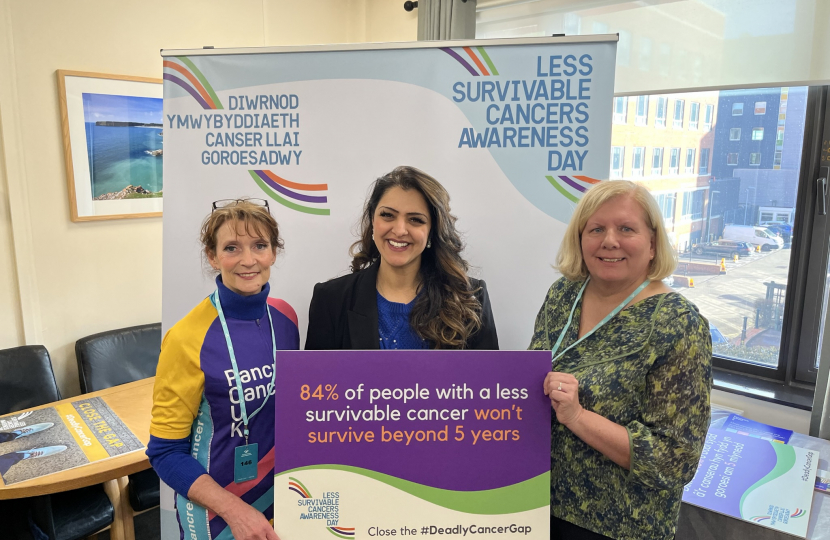
Natasha Asghar MS is supporting the Less Survivable Cancers Taskforce’s campaign to improve the poor survival chances of people diagnosed with lung, liver, brain, oesophagus, pancreatic or stomach cancers.
New figures, released by the Taskforce on Less Survivable Cancers Awareness Day 2024, based on a new analysis of existing data and the world survival rankings of those cancers, show that Wales, and the whole of the UK, lags woefully behind other countries when it comes to patient survival.
The data shows that out of 33 countries of comparable wealth and income levels, Wales ranks as low as 32nd for five year survival for stomach cancer and 31st for pancreatic and lung cancers.
This rises to 21st for both liver cancer and oesophageal cancer and 12th for brain cancer. This poor survivability for less survivable cancers is similar across all UK nations.
The countries with the highest five year survival rates for less survivable cancers were Korea, Belgium, USA, Australia and China and the new analysis found that, if people in the UK survived at the same rate as those in these countries, then over 8,000 lives could be saved annually.
Currently, in the UK around 15,400 people will survive for five years following a diagnosis of a less survivable cancer - if the UK had survival rates comparable to the top five performing countries, this number could be close to 24,000.
The LSCT is calling for all UK governments to commit to increasing survival rates for less survivable cancers by eliminating avoidable delays in diagnosis and proactively investing in research and treatment options.
Natasha Asghar, Member of the Welsh Parliament for South East Wales, said: “I fully support the Less Survivable Cancers Taskforce and their calls on Less Survivable Cancers Awareness Day to improve the currently terrible prospects for people diagnosed with these cancers.”
Judi Rhys MBE, Chief Executive of Tenovus Cancer Care and Chair of the Less Survivable Cancers Taskforce Wales subgroup, said: “People diagnosed with one of these six cancers still have a shockingly low life expectancy. The figures released today are concerning and it’s extremely disappointing to see how poorly Wales, and the UK, compares to our international counterparts.
“The actions we’ve repeatedly called for - targeted screening and monitoring those most at risk - would have a huge impact on survival. These latest statistics should be a strong reminder to Welsh Government of the importance of prioritising and accelerating cancer survival initiatives.
“Without concerted effort and action now, we will continue to miss opportunities to save lives.
“It’s a really positive step to see so many MSs including Natasha Asghar supporting our Less Survivable Cancers Awareness Day.”
___________________________________________________________________________________
Mae Natasha Asghar AS yn cefnogi ymgyrch y Tasglu Canserau Llai Goroesadwy i wella cyfleoedd goroesi gwael pobl sy'n cael diagnosis o ganser yr ysgyfaint, yr afu, yr ymennydd, yr oesoffagws, y pancreas neu'r stumog.
Mae’r ffigurau newydd, a ryddhawyd gan y Tasglu ar Ddiwrnod Ymwybyddiaeth Canserau Llai Goroesadwy 2024, yn seiliedig ar ddadansoddiad newydd o'r data presennol a safleoedd byd goroesi'r canserau hynny, yn dangos bod Cymru, a'r DU gyfan, ar ei hôl hi yn druenus o gymharu â gwledydd eraill o ran goroesiad cleifion.
Mae'r data'n dangos, o’r 33 gwlad sydd â lefelau cyfoeth ac incwm cymaradwy, fod Cymru mor isel â’r 32ain safle am oroesiad pum mlynedd ar gyfer canser y stumog a’r 31ain safle ar gyfer canser y pancreas a'r ysgyfaint.
Mae hyn yn codi i'r 21ain safle o ran canser yr afu a chanser yr oesoffagws a'r 12fed safle ar gyfer canser yr ymennydd. Mae'r lefelau goroesi gwael hyn ar gyfer canserau llai goroesadwy yn debyg ar draws holl wledydd y DU.
Y gwledydd â'r cyfraddau goroesi pum mlynedd uchaf ar gyfer canserau llai goroesadwy oedd Korea, Gwlad Belg, UDA, Awstralia a Tsieina a chanfu'r dadansoddiad newydd, pe bai pobl yn y DU yn goroesi ar yr un gyfradd â'r rhai yn y gwledydd hyn, y gellid achub dros 8,000 o fywydau bob blwyddyn.
Ar hyn o bryd, yn y DU bydd tua 15,400 o bobl yn goroesi am bum mlynedd yn dilyn diagnosis o ganser llai goroesadwy - pe bai gan y DU gyfraddau goroesi tebyg i'r pum gwlad sy'n perfformio orau, gallai'r nifer hwn fod yn agos at 24,000.
Mae'r LSCT yn galw ar i holl lywodraethau'r DU ymrwymo i gynyddu cyfraddau goroesi canserau llai goroesadwy trwy leihau’r oedi cyn cael diagnosis a thrwy fuddsoddi’n rhagweithiol mewn ymchwil ac opsiynau triniaeth.
Meddai Natasha Asghar, yr Aelod o’r Senedd dros Ddwyrain De Cymru: "Rwy'n llwyr gefnogi’r Tasglu Canserau Llai Goroesadwy a'u galwadau ar Ddiwrnod Ymwybyddiaeth o Ganserau Llai Goroesadwy i wella'r rhagolygon ofnadwy ar hyn o bryd i bobl sy'n cael diagnosis o'r canserau hyn."
Meddai Judi Rhys MBE, Prif Weithredwr Gofal Canser Tenovus a Chadeirydd is-grŵp Tasglu Canserau Llai Goroesadwy Cymru: "Mae gan bobl sy'n cael diagnosis o un o'r chwe chanser hyn ddisgwyliad oes syfrdanol o isel o hyd. Mae'r ffigurau a gyhoeddwyd heddiw yn peri pryder ac mae'n hynod siomedig gweld pa mor wael mae Cymru, a'r DU, yn cymharu â'n cymheiriaid rhyngwladol.
"Byddai'r camau rydyn ni wedi galw amdanyn nhw dro ar ôl tro - sgrinio wedi'i dargedu a monitro'r rhai sydd fwyaf mewn perygl - yn cael effaith enfawr ar oroesiad. Dylai'r ystadegau diweddaraf hyn atgoffa Llywodraeth Cymru yn gryf o bwysigrwydd blaenoriaethu a chyflymu mentrau goroesi canser.
"Heb ymdrech a gweithredu ar y cyd nawr, byddwn yn parhau i golli cyfleoedd i achub bywydau.
"Mae'n gam cadarnhaol iawn gweld cymaint o Aelodau o’r Senedd, gan gynnwys Natasha Asghar yn cefnogi ein Diwrnod Ymwybyddiaeth o Ganserau Llai Goroesadwy.”
